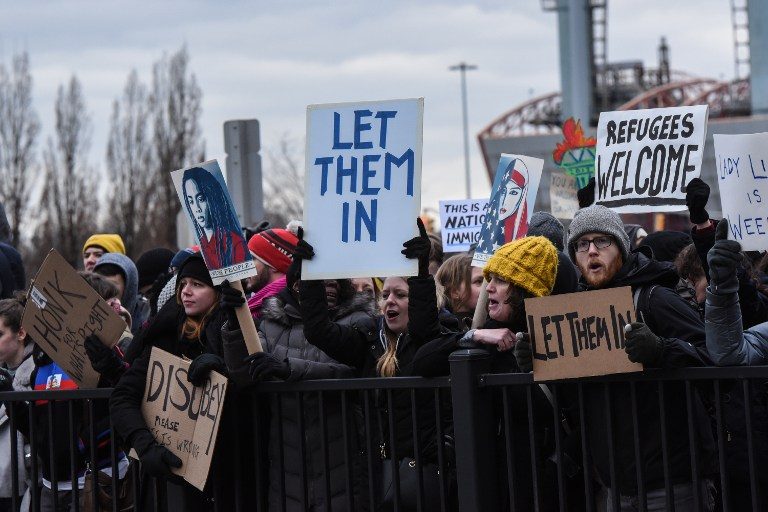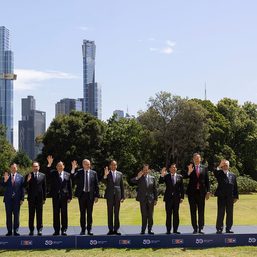SUMMARY
This is AI generated summarization, which may have errors. For context, always refer to the full article.

DUBAI, UAE – Gulf monarchies, notably Saudi Arabia, and other major Muslim nations have been spared the US travel ban because they are crucial allies of Washington and not “failed states”, experts say.
President Donald Trump’s controversial executive order on Friday singled out citizens from Iran, Iraq, Libya, Somalia, Sudan, Syria and Yemen to prevent “radical Islamic terrorists” from entering the United States.
But the ban, which could still extend to other states, has exempted Muslim-majority nations associated with major attacks in the West.
Out of the 19 hijackers of planes used in the September 11, 2011 attacks, 15 came from Saudi Arabia, also the birthplace of Al-Qaeda founder and attack mastermind Osama bin Laden.
The other four included the Egyptian plot leader, two Emiratis and a Lebanese.
Saudi Arabia and other Gulf and Arab nations are also home to scores of jihadists who have joined Al-Qaeda and its rival Islamic State group, both of which have been behind deadly attacks in Europe.
But the kingdom, cradle of the austere Sunni doctrine of Wahhabism, has traditionally been a strategic ally of Washington.
“Trump appears to consider – in line with longstanding mainstream US policy – the Gulf states as crucial allies for the United States government,” said Adam Baron, a visiting fellow and Yemen specialist at the European Council on Foreign Relations.
“The nations appear to have been chosen due to their governments’ poor relations with the US or their precarious state,” he said.
Saudi Arabia has been in war with Al-Qaeda for more than a decade, hitting what it calls the “deviant group” with an iron fist. It is also in the US-led coalition fighting ISIS, along with other Gulf states.
US partners
The ban is not about “countries where we have close partnerships with their counter-terrorism forces and where there is a well-developed structure of intelligence cooperation”, said Anthony Cordesman, from the Washington-based Centre for Strategic and International Studies.
The same applies to Egypt, the Arab world’s most-populous nation and birthplace of the transnational Muslim Brotherhood – branded as terrorist by Cairo and main Gulf states.
“Egypt and Saudi Arabia are seen as the main US partners in the region,” said Victor Salama, political science professor at Cairo University, highlighting a “convergence in points of view” between Trump and Egyptian President Abdel Fattah al-Sisi.
“Sisi was the first to congratulate Trump” from the Middle East after the November election, Salama noted.
Intelligence cooperation with Cairo could also mean Washington finds the “Egyptian services reliable enough to trust them in controlling their nationals”, said Tawfik Aclimandos, a lecturer in political science at Cairo University.
Hot on the heals of the travel ban, Trump called Saudi King Salman and UAE strongman Sheikh Mohammed bin Zayed, Abu Dhabi’s crown prince.
Trump agreed with both on cooperation to fight “radical Islamic terrorism”, the White House said.
He also agreed with the Saudi monarch to “rigorously” enforce the nuclear agreement with Riyadh’s arch-foe Iran, an agreement that Trump had opposed.
“The enemy of my enemy is my friend. Since Saudi Arabia is the enemy of Iran in the region and Iran is the enemy of Israel, then the US is the friend of Saudi Arabia,” argued Mathieu Guidere, a Paris-based professor of Middle East geopolitics.
Business interests
But as much as strategic ties affect the ban, the decision was based on “indicators of failed states” that are “unable to ensure security and exchange data with the US about their citizens”, Guidere said.
The billionaire president’s business interests have also been cited as why some countries were not on the list.
A map compiled by Bloomberg showed that Trump has business ties with Egypt, Saudi Arabia, Turkey and the UAE.
But analysts downplay such a claim.
“Getting the occasional fee for selling a brand name is not really enough to motivate a president,” said Cordesman.
Beyond the Middle East, Trump has business interests in Indonesia, the world’s largest Muslim country that has long struggled with Islamic militancy and suffered deadly attacks.
“He doesn’t want to jeopardise that,” said Tobias Basuki, a political analyst from Jakarta-based think tank the Centre for Strategic and International Studies.
He said that Indonesia as “a democracy” is not a threat.
“Of course within his so-called constituency, no one is afraid of Indonesia. Right-wing conservatives don’t even know where Indonesia is, so it’s not a problem for him,” Basuki said.
But regardless of where it hits, the ban “will be problematic no matter where Trump wants to apply it, whether weak or strong states”, said Ibrahim Fraihat, conflict resolution professor at the Doha Institute for Graduate Studies.
“It violates basic human rights,” he said. – Rappler.com
Add a comment
How does this make you feel?
![[In This Economy] Can the PH become an upper-middle income country within this lifetime?](https://www.rappler.com/tachyon/2024/04/tl-ph-upper-income-country-04052024.jpg?resize=257%2C257&crop=295px%2C0px%2C720px%2C720px)


![[OPINION] Controversy over ASEAN’s ‘Swift’ week](https://www.rappler.com/tachyon/2024/03/tl-asean-swift-week.jpg?resize=257%2C257&crop=357px%2C0px%2C720px%2C720px)

There are no comments yet. Add your comment to start the conversation.